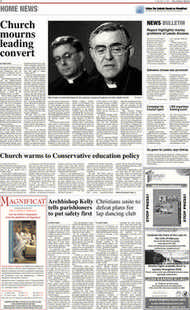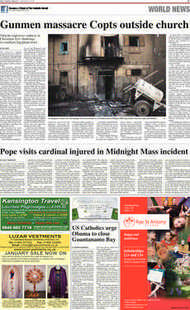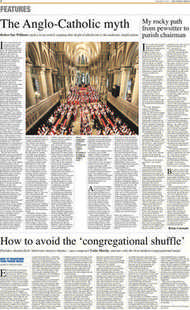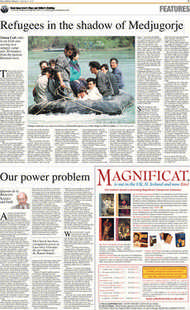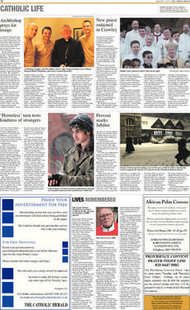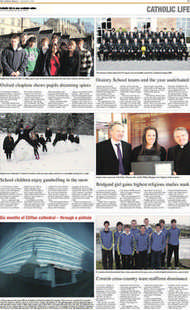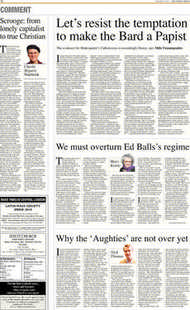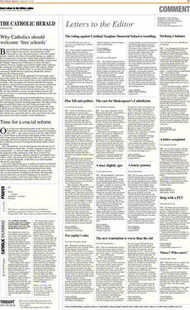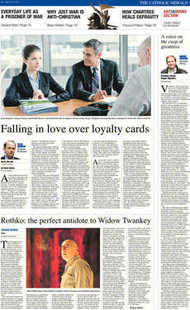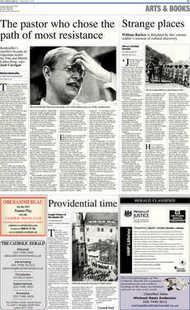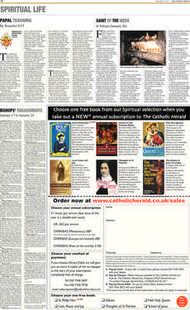Page 5, 15th January 2010
Page 5

Report an error
Noticed an error on this page?If you've noticed an error in this article please click here to report it.
Tags
Share
Related articles
Africa
Everyone Joined In At Priest's Request
Shenouda Released
Sadat Invites The Pope To Mt Sinai
Coptic Pope Purged
Gunmen massacre Copts outside church
Vatican expresses sadness at Christmas Eve shootings in southern Egyptian town
BY ED WEST
THE VATICAN’S leading ecumenist has sent a letter to the Egyptian Coptic patriarch expressing his solidarity after seven Christians were massacred after Midnight Mass in the country’s latest sectarian attack.
The drive-by shooting occurred in the southern town of Nag Hammadi, 40 miles from Luxor, as worshippers were leaving the Virgin Mary Church after Christmas Eve Mass on January 6. Coptic Christians, who use the Alexandrian calendar, celebrate Christmas on January 7.
Cardinal Walter Kasper, president of the Pontifical Council for Promoting Christian Unity, wrote to Orthodox patriarch Pope Shenouda III, expressing his concern.
“With sadness I have heard the tragic news of the death and injury of several Coptic Christians after a Christmas Midnight Mass in Nag Hammadi,” the cardinal wrote. “Please know that I am united in prayer with Your Holiness and with the Coptic Christian community at this time.” Three people pulled up outside the church, killing at least six Coptic Christians and a security official and injuring 10 others, including two Muslim passers-by.
On Thursday last week protesters clashed with police at the hospital in Naga Hamady after more than 1,000 Christians gathered to collect six of the bodies.
Coptic Bishop Anba Kirol los of Nag Hammadi said there had been threats in the days leading up to the Christmas Eve service – a reason he decided to end his Mass an hour earlier than normal.
“For days, I had expected something to happen on Christmas Eve,” he told Associated Press. He also said he might have been a target, but had left the church minutes before the attack.
“A driving car swerved near me, so I took the back door,” he said. “By the time I shook hands with someone at the gate, I heard the mayhem, lots of machine gun shots.” Witness Youssef Sidhom told the BBC that the attack shocked everyone, including police guarding the church.
Coptic Christians make up 10 per cent of Egypt’s 80 million population and claim descent from the ancient Egyptians. They split from the Catholic Church in 451 and are now doctrinally very similar to the Eastern Orthodox Church.
Copts have complained of growing harassment and discrimination in recent years, and say that attacks have gone unpunished. Egypt, although a secular dictatorship, is plagued by Islamist groups, most notoriously the Muslim Brotherhood, who are especially prominent in the south.
There have been MuslimChristian tensions in Nag Hammadi since a Christian man was accused of raping a Muslim girl in November. There were five days of riots in the town, with Christian properties set on fire and damaged. Following the Christmas attack Christians and Muslims set fire to homes and shops in nearby villages.
Cardinal Kasper said Christians must work together for peace, justice and reconciliation and stand united against persecution. “When your Christians suffer unjustly it is a wound to the body of Christ in which all believers share,” he wrote. “Together we pray for healing, peace and justice. All Christians must stand united in the face of oppression and seek together the peace that only Christ can give.” Last Sunday Pope Benedict XVI condemned the use of violence carried out in the name of God in an address that made allusions to antiChristian violence in Egypt, Iraq and Malaysia.
“Violence against Christians in some countries has provoked the indignation of many people,” especially because the recent hostility has been perpetrated during “the most sacred days” of the Christmas season, he said after his Angelus address to pilgrims gathered in St Peter’s Square.
Pope Benedict said that political and religious leaders “must not shirk their responsibilities” when it comes to confronting violence against fellow citizens.
“There can be no violence in the name of God, nor can one think of honouring him by offending the dignity and freedom of other people,” he said. In Iraq, where a Christian church in Mosul was targeted in late November, yet another church was bombed on December 23.
In Malaysia nine churches have been firebombed since a court ruled on December 31 that the word “Allah” can be used by non-Muslims as a term for God. The word is used in Malay and comes from Arabic, and Arabicspeaking Christians used the word for centuries before the arrival of Islam.
The government has insisted that the use of the word by Christians, who make up nine per cent of the Muslim-majority nation’s population, could cause confusion and encourage religious conversion, which is illegal for Muslims in Malaysia. Moderates fear it is the latest sign that the secular, multiethnic country is being Islamised.
Increasingly stringent religious court rulings have caused unease among Malaysia’s ethnic Chinese and Indian minorities, who fear their rights are being eroded as political parties battle for the support of the 62 per cent Malay majority.
Malaysian Catholic bishops called the escalation of violence against Christian churches in their country a “worrisome and delicate” situation, according to Fides, the Vatican missionary news agency.
“The Malaysian Church is concerned and did not expect that the question of the use of the word ‘Allah’ would be followed by a reaction of this kind, with attacks against churches and Christian buildings,” the bishops said. “There is an urgent need to work for dialogue.”
blog comments powered by Disqus



